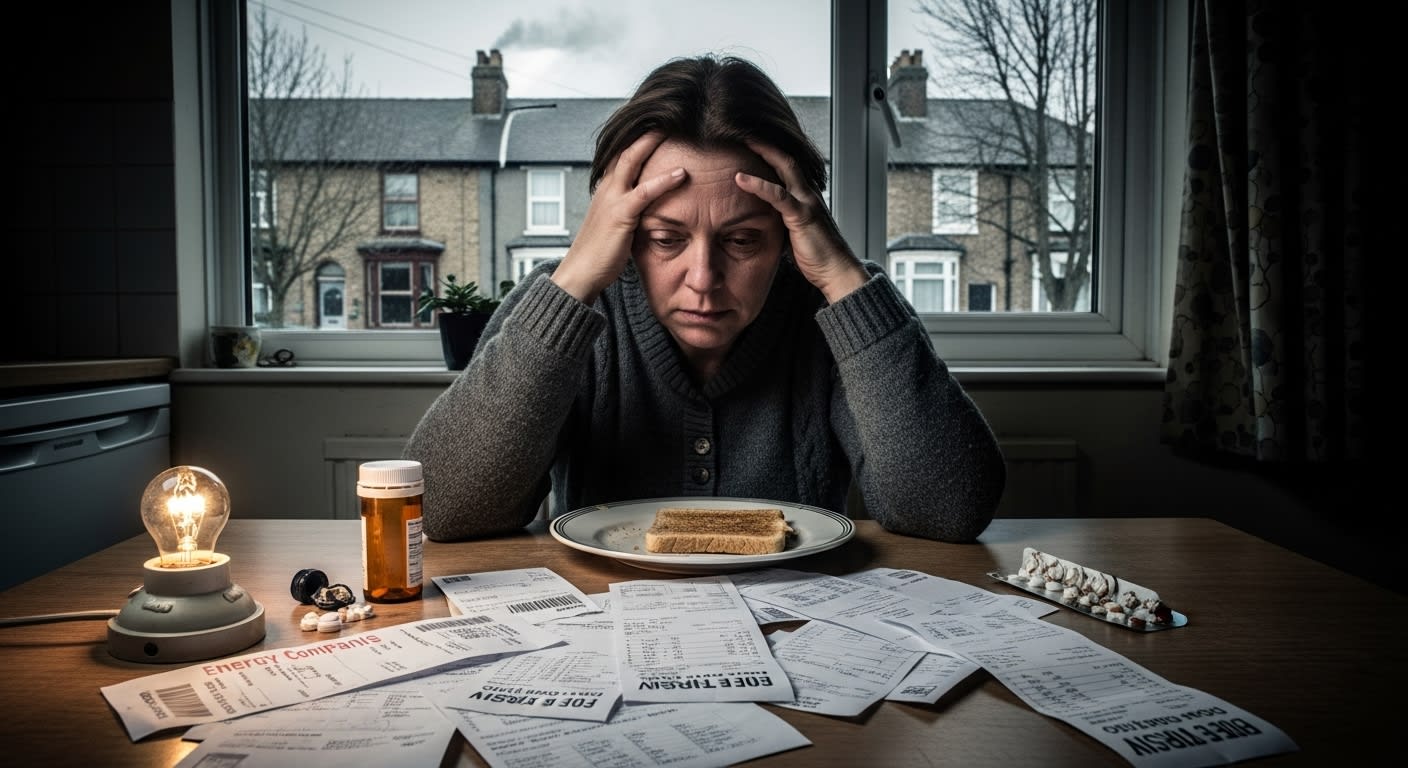
- Call: 01206 913 222
- Mail: transport@qcmhealthcare.co.uk
- Company no:
- 12140857

- CRISIS SUPPORT
- Nov 17, 2025
Cost-of-Living Crisis in the UK and Its Impact on Health
The cost-of-living crisis in the UK has become more than an economic problem. In fact, it has rapidly evolved into a major public health emergency affecting millions of households. Since the cost-of-living crisis in the UK touches every aspect of daily life, from housing to mental wellbeing, it is now one of the biggest threats to long-term health. As a result, QCM Healthcare remains committed to raising awareness and promoting solutions that protect communities. With the cost-of-living crisis in the UK worsening, understanding its health impact has become essential for action.
Understanding the UK Cost-of-Living Crisis and Its Public Health Consequences
The root of this crisis lies in rapidly rising prices, inflation, supply chain disruptions, and stagnant wages. Although many families are working harder than ever, their income no longer stretches to cover essentials. Consequently, people face daily decisions that compromise their health. Furthermore, vulnerable households experience greater difficulties, widening existing health inequalities. Because the crisis overlaps with a fragile healthcare system, its impact becomes even more severe.
Key Economic Drivers Behind the Crisis
The UK is currently facing one of the most severe economic crises in recent decades, and several key economic drivers are responsible for the situation. Inflation has risen to record levels, pushing the cost of food, fuel, transport, and housing far beyond what many households can afford. Wages have increased slightly, yet they have not kept pace with the rapid rise in living expenses. As a result, families now struggle to cover even the most basic necessities. Because income is stretched so thin, people make difficult choices that compromise their health, wellbeing, and long-term stability.
As inflation grows and real incomes drop, individuals begin cutting back on essential expenses such as heating, nutritious food, and healthcare services. Although these decisions may feel unavoidable, they create a dangerous cycle. Reduced access to heat leads to increased illness, skipping healthy meals results in nutritional deficiencies, and avoiding medical care delays treatment. Ultimately, these changes heighten the risk of long-term physical and mental health problems. The crisis does not affect everyone equally, and vulnerable communities face the harshest impacts. People with disabilities, older adults, low-income families, and individuals with chronic illnesses already have higher healthcare needs. Consequently, they experience greater harm when essential costs rise. Their limited financial resources combined with higher medical expenses place them in extremely challenging and dangerous situations.
A major aspect of the crisis involves fuel poverty, which has become a critical health threat across the UK. With energy prices rising sharply, millions of households cannot afford to properly heat their homes. Therefore, many families ration electricity and gas, keeping their homes much colder than recommended. Although this may seem like a practical short-term solution, the long-term health consequences are severe. Cold homes lead to increased risks of heart disease, respiratory infections, childhood asthma, and frequent hospital admissions. Additionally, insufficient heating often causes dampness and mould, which significantly worsen breathing problems, especially among children, older adults, and people with respiratory conditions. Every winter, thousands of preventable deaths occur due to poorly heated homes. Because vulnerable individuals cannot regulate their body temperature effectively, they face substantially higher risks when exposed to cold living environments.
RECOMMENDED:
Top 5 Ways to Develop Effective Relapse Prevention Strategies
5 Early Signs and Symptoms of Mental Health crisis
5 Ways To Self-Refer for Mental Health Support in The UK
Another growing concern is the rise in food insecurity and the decline in nutritional health. As food prices continue to climb, families are forced to make difficult decisions about what they purchase. Consequently, many people skip meals, buy cheaper low-quality foods, or rely on food banks to meet their daily needs. Although this helps stretch limited budgets, it results in less nutritious diets that contribute to long-term health issues. Cheaper foods, often high in fat, sugar, and salt, may fill hunger gaps but increase the risk of obesity, diabetes, and cardiovascular diseases. Children in low-income households face stunted growth, learning challenges, weakened immunity, and higher rates of chronic conditions. Adults in these environments experience elevated risks of hypertension, digestive issues, high cholesterol, and other nutrition-related illnesses.
The economic crisis has also caused a significant deterioration in mental health across the UK. As households struggle to manage bills, debt, and job insecurity, many people experience anxiety, insomnia, depression, and emotional exhaustion. The psychological toll is profound, especially when financial instability persists for long periods. In addition, mental health challenges often create a feedback loop: financial stress worsens mental wellbeing, and poor mental wellbeing makes it harder to manage money, maintain employment, or seek support. As a result, many individuals find themselves trapped in a cycle of worsening financial and emotional hardship. Demand for NHS mental health services has increased sharply, making support harder to access. This is why organisations like QCM Healthcare continue to play an essential role by offering compassionate mental health support for individuals in crisis.
These economic pressures have intensified existing health inequalities across the UK. Groups such as families with young children, disabled individuals, older adults, and people living in deprived communities face disproportionate challenges. Because these groups already require more support, rising costs make it even harder for them to meet essential needs. Economic hardship also increases the likelihood of adverse childhood experiences (ACEs), which are known to affect physical and mental health throughout a person’s lifetime. Children raised in stressful environments may face lifelong disadvantages, including learning difficulties, emotional disorders, and chronic health problems. Studies also predict that premature deaths will rise significantly if the crisis continues without meaningful intervention.
Despite the severity of the crisis, community responses and policy solutions offer hope. Local support groups, food banks, charities, and advice centres are playing a vital role in helping households cope. These organisations provide meals, financial guidance, emotional support, and emergency assistance. Their services often prevent families from entering deeper hardship. Nevertheless, long-term solutions require government action. Income reforms, improved welfare support, and better wage protections are essential to reducing the crisis’s impact. Additionally, improving housing quality and investing in energy-efficient homes would protect millions from cold-related illnesses and reduce financial pressure on households.
It is clear that the UK’s economic crisis is not merely a financial issue, it is a public health emergency. Health depends on stable income, safe housing, nutritious food, and accessible support systems. Since the crisis affects all these areas, urgent action is required from policymakers, organisations, and communities. Meanwhile, organisations like QCM Healthcare continue providing essential support through mental health services, community outreach, and advocacy. Their work plays a crucial role in helping individuals navigate challenges and recover with dignity.
Take Action to Protect Your Health Today
The cost-of-living crisis in the UK is more than a financial challenge, it is a public health emergency affecting families nationwide. Because your wellbeing matters, QCM Healthcare encourages you to seek support early, connect with local services, and prioritise your physical and mental health. Visit QCM Healthcare today to access trusted guidance and take the first step toward a healthier, more stable future.
Frequently Asked Questions Cost-of-Living Crisis in the UK
1. How is the cost-of-living crisis affecting public health in the UK?
It increases risks of cold-related illnesses, hunger, stress, and long-term chronic diseases.
2. Why are cold homes dangerous for vulnerable groups?
Cold homes worsen respiratory problems, raise blood pressure, and increase risks of heart attacks and hypothermia.
3. How does food insecurity contribute to long-term health problems?
Poor nutrition leads to obesity, diabetes, learning problems in children, and weakened immunity.
4. What role does financial stress play in mental health decline?
It contributes to anxiety, depression, insomnia, and difficulty coping with daily tasks.
5. Which groups are most affected by the crisis?
Low-income families, disabled people, older adults, and those with chronic illnesses face the highest risks.
6. What policies can reduce the health impact of the crisis?
Improved wages, stronger welfare support, and better housing quality can significantly reduce harm.
7. How can communities support struggling households?
By offering food assistance, financial advice, emotional support, and safe community spaces.


Comments (0)
No approved comments yet.